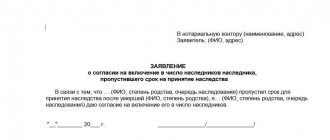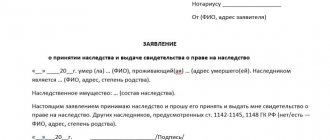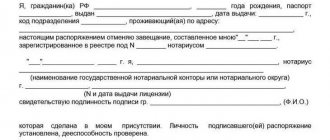Author
Sergey Ershov
Registration number in the register of lawyers of St. Petersburg – 78/5563
The other day you learned about the property you were entitled to by law or by will, but the deadline established by the Civil Code of the Russian Federation for its acceptance has long expired. I will tell you whether it is possible to enter into an inheritance after 10 years, after 20 or more, even without a good reason.
You will also find out what methods “late” heirs can use to restore their right to inherited property.
How long after death does one enter into inheritance?
The period for entering into an inheritance is the time period within which a potential heir, by law or by will, can exercise his right to inherit things, property, property rights and obligations. To accept an inheritance, you must submit a corresponding application to the notary or actually accept it.
The inheritance procedure must be initiated within a certain period of time - Art. 1154 Civil Code of the Russian Federation:
- For heirs under a will and first-priority applicants by law - within 6 months from the date of opening of the inheritance (i.e. from the moment of death or the day of expected death established by the court, or from the date of entry into legal force of the court decision declaring the citizen dead). This is the basic period for accepting an inheritance.
- Heirs of the second and subsequent stages are given 6 months from the moment of refusal of the heirs of the previous stage or from the moment the court decision on the removal of unworthy heirs enters into legal force, and if the heirs of the previous stage do not accept the inheritance, 3 months are given from the date of expiration of the period allotted by law. These are special deadlines for entering into inheritance.
- Heirs who have the right to inherit property through hereditary transmission (relatives of the heir who died before the expiration of the established period for accepting the inheritance) should enter into the inheritance before the expiration of 6 months (or a special period) from the date of death of the owner of the property. If the remainder of the period is less than 3 months, the period is extended to 3 months.
- An heir in the person of a conceived child - on behalf of a baby born alive, his legal representative must submit an application no later than 6 months from the date of birth of such an heir.
- Heirs who have accepted the inheritance after the fact - you can contact a notary both before the expiration of the basic entry period and at any time after, incl. both in 5 years and in 10.
- Heirs of escheated property - the terms for recognizing property as escheat are not established by law.
Important! If you miss the deadline under the will, the right to accept the inheritance due to you will pass to the remaining legal successors specified in the will, or to the heirs at law. The notary will divide your share of the inheritance among the applicants who entered into inheritance rights in a timely manner.
If there are no heirs, refused or did not accept the inheritance, or do not have the right to inherit or are removed as unworthy, the inherited property is recognized as escheat and becomes the property of the state, a subject of the Russian Federation or a municipal entity.
See also:
What is the deadline for entering into inheritance in 2021 according to the law of the Russian Federation - detailed answer
During what period can heirs claim inheritance?
The inheritance opens from the moment of death or from the date of entry into legal force of a court decision declaring a citizen dead - Art. 1114 of the Civil Code of the Russian Federation. But the notary is not obliged to notify potential heirs about the opening of a case, and missing deadlines is a common occurrence.
Not all applicants for inheritance declare their rights before the expiration of the 6 months allotted by law. This is due to the fact that there may be several heirs of one line or another, some refuse the inheritance, some are considered unworthy, some do not accept the inheritance on time.
In addition, disputes often arise between heirs that require resolution in court. And therefore, an inheritance case can last for years.
On a note. Persons who have been recognized as unworthy heirs or who have previously formalized with a notary a refusal to accept the property of the deceased cannot claim inheritance.
After the expiration of the basic or special period for accepting an inheritance, potential heirs can declare their right to it in one of 3 ways:
- In court - clause 1 of Art. 1155 of the Civil Code of the Russian Federation. The deadline for accepting an inheritance missed for valid reasons will be restored if the applicant for the inheritance files a claim in court no later than 6 months from the moment the reason for missing the deadline no longer exists and provides evidence that these reasons are valid. Having missed this deadline, the applicant is deprived of the right to its restoration.
- Proving that the inheritance was actually accepted - clause 2 of Art. 1153 of the Civil Code of the Russian Federation. The notary can accept the evidence or refuse it to the heirs. If you refuse, you will have to prove the fact of inheritance through the court. There is no deadline for submitting applications to the notary and to the court, since we are actually talking not about restoring the deadline, but about the actual acceptance of the inherited property.
- In a contractual manner, i.e. without going to court, but subject to receipt of written and notarized consent from all other heirs who accepted the inheritance - clause 2 of Art. 1155 of the Civil Code of the Russian Federation. If at least one heir objects, or you are the only heir, or all applicants for the inheritance missed the deadline for accepting the inheritance, restoration of the deadline will be possible only in court, and only if there are good reasons.
What difficulties will arise in court when reinstating the entry period after 10 years?
The burden of proving that the reasons for missing the deadline are valid lies with the late heir.
The deadline for filing a claim in court on issues of inheritance and for restoring violated rights and interests cannot exceed 10 years from the date of violation of the right for the protection of which this period was established - Art. 196 of the Civil Code of the Russian Federation. It begins to flow from the moment of death of the testator.
The application of the limitation period is possible only upon the application of a party to the dispute. The court has no right to invite the party to make a corresponding statement. The statement of other persons participating in the case about missing the deadline has no legal significance.
Therefore, it is possible to restore the missed deadline for accepting an inheritance and the status of an heir after 10 years if the following conditions are simultaneously met:
- You did not know and should not have known about the opening of the inheritance or missed this deadline for other valid reasons.
- The claim was filed no later than 6 months from the moment the reason for missing the deadline ceased.
- The second party did not declare in court that the statute of limitations had expired.
Difficulties may arise during the trial:
- Ignorance about the opening of an inheritance in itself cannot be a basis for restoring the missed deadline.
- The lack of information from the plaintiffs about the death of the testator is not one of the legally significant circumstances with which the law connects the possibility of restoring the term.
- Kinship relations imply not only the opportunity to present property claims for inheritance, but also “showing due attention of the heir to the testator during his lifetime.”
- Personal motives, due to which the plaintiff did not maintain contact for a long time and was not interested in the fate of a relative, cannot serve as a basis for restoring the period for accepting the inheritance.
- Among the valid reasons for missing the deadline for accepting an inheritance, the court considers circumstances related to the personality of the plaintiff: serious illness, helpless condition, illiteracy, etc., if they prevented the heir from accepting the inheritance during the entire period established for this by law.
- The burden of proving the existence of valid reasons for missing the deadline for accepting the inheritance after the death of the testator lies with the person who filed the request to restore this deadline.
Since the list of valid reasons is open and the other party to the dispute may not declare the expiration of the statute of limitations, there is a possibility of restoring your right to inheritance after 10 years or more, but only with competent legal support.
See also:
Legal advice from Sergei Ershov
Legal analysis and drafting of documents by Sergei Ershov
How to enter into an inheritance if 10 years have passed and there are no valid reasons
In the absence of valid reasons for missing the deadline after the death of the father, mother, grandmother or other relatives, you can enter into an inheritance in a year, and after 5, and after 10, and even after 20 years. But the options for joining are limited - there are only two:
- Enter into inheritance in fact.
- Obtain consent from all heirs who accepted the inheritance in a timely manner.
What happens if a person does not enter into an inheritance within 6 months or several years
As proven by judicial practice, one of the most common grounds for failure to apply remains ignorance of the death of the testator. In addition, other scenarios are possible. Sometimes the heir does not declare his rights for several years. It is not recommended to delay the application date for such a long period, since the new owner can resell the property or dispose of it in another legal way. In this case, the claims cannot be satisfied.
How to enter into an inheritance after 10 years - step-by-step instructions
For heirs who have missed the entry deadline without good reason, there are 2 ways to restore it. Missing
the established deadlines for submitting to a notary an application to accept an inheritance under a will or without it is not a reason to give up and forget about the property and property rights you are entitled to.
Regardless of how many years or even decades you are “late” for your visit to the notary’s office, use the step-by-step instructions below - it will allow you to:
- Assess your chances of regaining your right to inheritance.
- Understand how to act, when and where to turn in a certain situation.
What is the general procedure for entering into an inheritance after 5-10-20 years?
The answer to the question of whether it is possible to enter into an inheritance after 10 years will depend on the specific circumstances of your case. Next, you will learn about the nuances of actual and contractual inheritance, and I will also provide a general algorithm of actions and instructions for protecting your right to inheritance in each of these ways.
Step 1
Determine the place where the inheritance will be opened, i.e. which notary should you contact? The place of opening of the inheritance is the last place of residence of the testator - clause 1 of Art. 1115 of the Civil Code of the Russian Federation. If it is unknown or located outside the Russian Federation, then the place of discovery is the location of the inherited property or its most valuable part.
Step 2
Specify the address of the notary office and the notary in charge of the inheritance case, his full name. and operating mode. Call the notary chamber or contact the nearest notary office - they will provide you with the necessary information.
If you were unable to determine the place where the inheritance was opened, go to the website notariat.ru in the Register of Inheritance Cases and enter your full name. the testator (in full), the date of his birth and death (if there is no data on birth and death, they do not need to be entered). The system will give you the number of the inheritance case and information about the notary (full name, license number, address, phone number and work schedule).
Step 3
Visit the notary in charge of the inheritance case. Check with him what is included in the inherited property to understand whether it makes sense to restore rights to it.
If the inheritance also includes debt obligations, pay attention to the following points:
- The opening of an inheritance does not interrupt the limitation period for claims of creditors.
- The general limitation period cannot be less than 3 years, but no more than 10 years from the date of the first delay on the loan.
- Claims of creditors submitted after the statute of limitations have expired cannot be satisfied.
If 10 years have already passed since the death of the testator, you don’t have to worry about the debt; you won’t have to pay it off.
Step 4
Make a written application for acceptance of the inheritance or for the issuance of a certificate of inheritance. Each notary has his own forms of such documents and you can fill out the required application template directly on the day of application.
The Methodological Recommendations for Registration of Inheritance Rights state that when an application for acceptance of an inheritance is received in the inheritance case after missing the established deadline and in the absence of information confirming the actual acceptance of the inheritance by the applicant, the notary explains:
- Judicial procedure for restoring the missed deadline and recognizing the applicant as the heir who accepted the inheritance.
- The ability to accept an inheritance after the expiration of the established period in accordance with Art. 1155 of the Civil Code of the Russian Federation.
That. You can clarify all issues related to the actual entry into inheritance and obtaining consent from other heirs at an appointment with a notary.
Step 5
If you are a relative of the deceased, took possession or management of his property, maintained or took measures to preserve it, paid his debts, etc. (Clause 2 of Article 1153 of the Civil Code of the Russian Federation) - start collecting evidence of the actual acceptance of the inheritance in accordance with Art. 1154 of the Civil Code of the Russian Federation term.
Next, prepare an application for the actual acceptance of the inheritance and the issuance of a certificate of inheritance, attach supporting documents to it. Based on the evidence, the notary establishes the fact of acceptance of the inheritance.
If no questions arise, then you will be given a certificate confirming the right to a share or to all property that remained after the death of the deceased. However, in practice, even if the necessary documents are available, notaries refuse to issue such a document to the heirs.
If a notary refuses to issue you a certificate of inheritance, be sure to get a written refusal from him and apply to the court with an application to establish the fact of acceptance of the inheritance.
I will tell you in the article below how to prove the actual acceptance of an inheritance, how to draw up an application to a notary and to the court.
Step 6
For heirs who were “late” without good reason and did not accept the inheritance in fact, the law provides for the opportunity to resolve the issue out of court - this is contractual inheritance. The period for accepting an inheritance in this case is not limited by law.
In order for the notary to include you among those entitled to the inheritance, you must receive written statements (consents) from all persons who have already accepted the inheritance and present them to him. I will tell you below how to obtain consent, how to formalize it correctly and certify it.
Step 7
If you were able to prove the actual entry into the inheritance (from a notary or in court) or received written consent from all heirs, then the notary:
- Cancels previously issued certificates of inheritance.
- Will issue new certificates, which will be the basis for making changes to the record of state registration of rights to real estate, transport or other property subject to registration.
To obtain a certificate, you will need to pay a state fee in the amount of - clause 22 of Art. 333.24 Tax Code of the Russian Federation:
- 0.3% of the value of the inherited property, but not more than 100 thousand rubles. — for children, incl. adopted children, spouse, parents, full brothers and sisters of the testator;
- 0.6% of the value of the inherited property, but not more than 1 million rubles. - for other heirs.
On a note. Minor legal successors, as well as heirs who lived with the testator and continue to live in the inherited house (apartment, room) after his death do not pay the fee. And disabled people of groups I and II receive a discount of 50% - Art. 333.38 Tax Code of the Russian Federation. Benefits are provided only upon application.
What to do when the entry deadlines have been reinstated?
Some successors are wondering how to enter into an inheritance after missing the period for its acceptance. To do this you need to go to court. If this body made a decision to restore the terms, the successor must obtain a certificate of accession to the rights to inheritance. To do this, do the following:
- contact a notary with the relevant documents;
- conduct an appraisal examination of inherited property;
- pay the state fee for issuing a certificate of inheritance.
The amount of the state duty is determined based on the results of the assessment examination. According to Article 333.24, heirs of the first and second priority are required to pay 0.3% of the value of the property, but not more than 100 thousand rubles, and other categories of successors - 0.6% of the value, but not more than 1 million rubles.
The assessment examination can only be carried out by an authorized person. Its results must be entered on a form that is certified by the seal of the head of the organization responsible for conducting the examination.
In order to issue a certificate of inheritance rights, you must prepare the following documents:
- court decision to restore the period of acceptance of inheritance;
- application for inheritance;
- death certificate of the testator, which can be obtained from the registry office;
- a will (if one has been drawn up);
- a certificate of the last place of registration of the testator with a note about his deregistration;
- documents that confirm that the testator has rights to his property.
After the successor receives a certificate of inheritance, he can contact the registration authorities in order to transfer the property to himself. In addition to the certificate, you must submit an application for registration and property documents to Rosreestr or the MFC.
How to prove actual entry into inheritance rights - instructions
Often, heirs believe that the inheritance by will or law passes to them automatically and they do not need to formalize anything. At the same time, they used the inherited property, but did not contact the notary and did not declare their rights.
It is considered that the heir has actually accepted the inheritance if, within the 6-month period allotted by law for entering into the inheritance, he has carried out at least one of the listed actions, which manifests the heir’s attitude towards the inheritance as his own property - clause 2 of Art. 1153 Civil Code of the Russian Federation:
- Took possession or management of the inheritance - lived in the apartment of the deceased, operated a car, cultivated a plot of land, managed the assets of the deceased, etc.
- Took measures to protect against encroachments or claims of third parties, to preserve property - transferred things for storage, installed a security alarm or locks on the property.
- Performed maintenance/repairs at his own expense - covered maintenance costs (paid utility bills, underwent technical inspections) and maintained the facility in proper condition (cared for the lawn and garden, fought weeds)
- He paid off the debts of the testator - he began to repay loans, loans, and mortgages.
- Received funds due to the testator from third parties.
Important! Any of these actions can be performed either by the heir himself or by other persons on his behalf. Joint ownership of property with the testator, receipt of compensation for funeral services and funeral benefits do not in themselves indicate the actual acceptance of the inheritance - clause 36 of the RF Supreme Court No. 9.
What are the ways to confirm the acceptance of an inheritance?
You can confirm the acceptance of an inheritance in one of 3 ways:
- Submit an application to a notary.
- Submit an application to the court in special proceedings.
- File a claim in court if a dispute arises with other legal successors.
What procedure to follow to establish the fact of inheritance after 10 years
The procedure for actually accepting an inheritance consists of several steps:
- Prepare evidence of acceptance of the property.
- Provide the documents to the notary.
- Draw up an application for actual acceptance of the inheritance.
- The notary will analyze your actions and, if he considers them sufficient, he will recalculate the shares of the heirs in accordance with the requirements of the law or the will, and after you pay the state fee, he will issue a certificate.
- If a notary refuses to issue a certificate, get a written refusal from him.
- Prepare documents for the court - an application to establish the fact of acceptance of the inheritance or a statement of claim.
- Wait until the court decision comes into force and contact the notary again. He will establish the fact of acceptance of the inheritance on the basis of a judicial act, since the court decision is subject to strict execution - clause 2 of Art. 13 Code of Civil Procedure of the Russian Federation.
How to make an application to a notary
This document must be drawn up in writing - Art. 62 Fundamentals of the legislation of the Russian Federation on notaries. The application must contain the following information:
- Full name of the heir and testator.
- Grounds for inheritance (based on a will, family or other relationships).
- Degree of relationship if you enter into an inheritance without a will.
- Date of death, death certificate number.
- The last place of residence of the testator.
- Actions for the actual acceptance of the inheritance, the period of their completion and who performed them (the heir himself or other persons on his behalf).
- The date when the application was drawn up, and the heir’s full name and signature.
Sample application for acceptance of inheritance and issuance of a certificate of inheritance (DOC 15 KB).
What documents and what evidence to prepare?
Indicate in your application all the facts and documents confirming your actions to actually accept the inheritance.
To contact a notary, prepare a package of documents:
- Your passport.
- Death certificate of the testator.
- A will or documents confirming the relationship with the testator and indicating the degree of relationship (birth certificate, marriage certificate).
In order to confirm the actual acceptance of the inheritance, the following may be submitted:
- A certificate of living together with the testator and that you used the testator’s residential property before and after his death.
- A certificate stating that you used the property - from a dacha, garage, or garden cooperative.
- Receipts for payment of utility bills and payment of contributions.
- Agreements for repair work, for the protection of inherited property...
- Checks, receipts for the purchase of materials, spare parts, consumables for the maintenance of inherited property.
- Receipts confirming receipt of debt obligations of the testator or repayment of debts.
- Bank statements on repayment of loans issued to the testator.
- Photographs or videos of repairs or other work being performed.
Documents and certificates must confirm that the actions for the actual acceptance of the inheritance were performed by the heir within the period established for acceptance of the inheritance.
Is it possible to refer to the testimony of witnesses?
Testimony of witnesses who are ready to confirm the fact of acceptance and use of the inheritance can also serve as evidence. Usually attracted:
- Relatives, acquaintances, friends, neighbors.
- Loaders, builders.
- Gas station attendants, parking lot guards, auto mechanics.
- Persons present when transferring money to creditors or accepting money from debtors of the testator.
What to do if a notary refuses to issue a certificate of inheritance
Convincing documentary evidence of the actual acceptance of the inheritance - the opportunity to enter into the inheritance even after 10 years.
If you accepted the inheritance in fact within 6 months after the death of the testator, but the notary has doubts, you will have to confirm the fact of acceptance through the court. You can make demands:
- As a special proceeding, you should submit an application to establish the fact of acceptance of the inheritance.
- By way of claim proceedings - if there is a dispute about the right, i.e. If disagreements arise with other heirs, file a claim.
What procedure to follow when going to court
Follow the following sequence of actions:
- Prepare an application to the court to establish the fact of acceptance of the inheritance.
- Attach to your application a written refusal of the notary to issue you a certificate of inheritance.
- Pay the state fee - for special cases, its amount is 300 rubles. (Clause 8, Clause 1, Article 333.19 of the Tax Code of the Russian Federation). When filing a claim of a property nature, calculate the amount of the fee based on the price of the claim, taking into account the requirements of paragraphs. 1 clause 1 art. 333.19 Tax Code of the Russian Federation.
- Attach a receipt for payment of the state fee to the application.
- Apply to the court and wait for its decision.
How to apply to court
Applications are submitted to the district court at the applicant’s place of residence or the location of the inherited real estate - Art. 266 Code of Civil Procedure of the Russian Federation. You can send the document:
- In person - bring it to the office.
- By registered or valuable mail with a list of attachments and acknowledgment of delivery.
- In electronic form - by posting it on the official website of the court, if there is a technical possibility for this.
How to draw up an application to establish the fact of acceptance of an inheritance
The application is drawn up taking into account the requirements of Art. 131 Code of Civil Procedure of the Russian Federation. It contains the following information:
- Name of the court to which the application is filed.
- FULL NAME. applicant, place of residence.
- Information about the notary leading the inheritance case.
- The need to establish the fact of acceptance of the inheritance in order to obtain a certificate of ownership.
- Justification that within 6 months from the date of opening of the inheritance you actually accepted it, that is, you performed actions that indicate your intention to acquire the inheritance.
- Information about the actions taken indicating the acceptance of the inheritance, and what evidence confirms this. You can indicate your full name. and the place of residence of witnesses who can confirm the stated circumstances.
- The list of documents attached to the application will be the same as the one you prepared for the notary.
The application must be signed.
Sample application to the court to establish the fact of acceptance of inheritance (DOC 15 KB).
Sample application to the court to establish the fact of acceptance of inheritance
How to file a claim
The statement of claim is drawn up according to the same rules as the statement to establish the fact of acceptance of the inheritance. Additionally, it should indicate the price of the claim and the requirement for recognition of ownership of the disputed inherited property.
Sample statement of claim to establish the fact of acceptance of inheritance and recognition of ownership (DOC 15 KB).
Can a court refuse to recognize the right to inheritance?
The courts make a decision to refuse in the following cases:
- Evidence of actual inheritance is insufficient or absent.
- The actual acceptance of the property occurred after a 6-month period from the date of death of the testator.
- The actions you took were one-time in nature.
How to enter into an inheritance by agreement with other heirs
Try to contact the successors who have already entered into the inheritance with a request to accept you as an heir.
You can enter into an inheritance after the expiration of the period established for its acceptance without going to court, but subject to obtaining written consent to this from all other heirs who accepted the inheritance - Art. 1155 of the Civil Code of the Russian Federation. This procedure is called contractual or conciliatory.
How to proceed with the contractual restoration of the period for entry
The law does not establish a time limit for entering into an inheritance through conciliation. You have the right to initiate this procedure after a year, and after 10 years, and after 20 years.
To restore the period for accepting an inheritance, you must:
- Apply to each of the successors who have already entered into the inheritance with a request to accept you among them. You can provide written notice or make the request orally.
- Obtain the consent of all persons entering into inheritance, expressed in the form of an application and documented in writing.
- Have their signatures on the consent to include you in the list of heirs certified by a notary or persons legally authorized to certify.
- Wait until the notary checks the grounds of inheritance from the persons who timely entered into inheritance rights, establishes your right to inheritance based on applications (consents), cancels previously issued certificates and redistributes the inherited property.
- Pay the state duty taking into account the requirements of clause 22 of Art. 333.24 Tax Code of the Russian Federation.
- Obtain a certificate of inheritance from a notary.
A notary's decision to cancel previously issued certificates is the basis for making changes to the record of state registration of rights to property, if one has been carried out.
Important! If you are the only heir or all heirs have missed the deadline for acceptance, it is impossible to restore the deadline by contract; you will either have to prove your actual entry into the inheritance, or try to restore the deadline through the court and prove the valid reasons for missing it.
How to draw up a statement of consent
Heirs who have entered into inheritance rights in a timely manner are not obliged to explain to you or the notary the reasons for their agreement/non-agreement to restore the term - this is their personal matter.
When deciding to give you the opportunity to inherit, they may:
- Sign one general statement from the notary leading the inheritance case.
- Complete the consent with a notary public.
- Draw up an application and submit it to the notary through you or another person.
- Send consent to the notary by mail.
If the heirs give consent to the redistribution of the hereditary mass not in the presence of a notary leading the inheritance case, then their signatures must be certified either by another notary or by a person authorized to certify powers of attorney - clause 3 of Art. 185.1 Civil Code of the Russian Federation:
- The organization where the heir works or studies.
- The administration of an inpatient medical institution, the head or his deputy for the medical unit of military hospitals, sanatoriums and other military medical institutions where the heir is being treated.
- The head of the prison where the heir is serving his sentence.
- The administration or head of the social protection body, if the heir lives in a social service organization.
Application for consent to include among the heirs an applicant who missed the deadline for accepting the inheritance (DOC 15 KB)
Heirs should fill out the consent form and have it notarized
It is not necessary to register
The law provides for the possibility of accepting an inheritance without going to a notary. The actual entry into the rights to use the property of the deceased allows us to draw a logical conclusion - it is not necessary to document it. That is, there is no need to obtain an official certificate from a notary and submit papers confirming the relationship. However, since ownership implies three types of powers:
- use;
- possessions;
- orders,
then a person who has not documented the transfer of property from the deceased to his own name is deprived of legal grounds to do with it as he sees fit. For example, alienation to other persons. That is, there will be an opportunity to own and use it, but the property cannot be sold. Of course, if we are not talking about movable or immovable property, property rights, securities, there is no need to register an inheritance. If after the death of a relative there remains a state that was subject to state registration, you should officially declare your rights.
What happens after the right to inheritance is restored?
Actual entry into an inheritance or obtaining consent from other heirs to restore the period for entry into an inheritance entails a redistribution of shares in the inheritance. The shares may decrease or may be lost altogether (if you were more closely related to the deceased or presented a will).
There are several ways to redistribute property between heirs - clause 3 of Art. 1155 Civil Code of the Russian Federation:
- Issues of transferring inherited property due to you in kind or paying compensation for its share in the inheritance are resolved in accordance with the rules of Art. 1104, 1105 and 1108 of the Civil Code of the Russian Federation.
- Redistribution of shares is possible by a written agreement between all heirs, including the heir whose rights have been restored - in this case, all successors are required to comply with the rules on the protection of the inheritance rights of minors, incompetent and limited in capacity citizens (Article 1167 of the Civil Code of the Russian Federation).
What happens when there are no heirs?
If all heirs are missing, then the algorithm of actions is determined by Article 1151 of the Civil Code of the Russian Federation. The property is recognized as escheated and transferred to the ownership of the state. In particular, the municipality to which it belongs.
If the circle of heirs is determined, but they do not apply to accept the inheritance, then in this case the inherited property is transferred to a notary for the purpose of its protection.
What to do if the inheritance has not survived
If the return of the inheritance in kind is impossible, you have the right to receive monetary compensation.
If, when accepting the inheritance after the expiration of the established period for any reason (sale, exchange, gratuitous alienation), the return of the inherited property in kind is impossible, the heir who is late in accepting the inheritance has the right only to monetary compensation for your share of the inheritance.
Compensation is calculated based on the value of a specific item on the day the inheritance is opened - Art. 1105 Civil Code of the Russian Federation, art. 42 PP RF Armed Forces No. 9.
FAQ
Q : Is it possible to enter into an inheritance after 5 years?
A : It is possible. If you have taken actions indicating its actual acceptance within 6 months from the date of death of the testator, or have received the consent of other heirs who accepted the inheritance, or have valid reasons for missing the deadline and are ready to defend your rights in court.
Q : Is it possible to get a share in the inheritance for a child if more than 10 years have passed since the death of his father, and the property went to the father’s sister - the child’s aunt?
A : The child is the heir of the first priority; in order to restore his rights, provide the notary with evidence of the actual acceptance of the inheritance by the child’s legal representative (mother, guardian) within 6 months from the date of death of the testator. If there is no such evidence, try to get the aunt’s consent.
Q : Is it possible to enter into an inheritance 10 years after the death of a mother for her children, if the whole family lived in the apartment and no one had previously drawn up documents for housing?
A : If at the time of your mother’s death and after you were registered in the apartment and lived in it, then you accepted the inheritance in fact - contact a notary with an application for a certificate of ownership. If he refuses, submit an application to establish the fact of acceptance of the inheritance in court.
Q : Is it possible to enter into an inheritance 10 years later for grandchildren after the death of a grandmother, if her children are still alive and her grandchildren have lived with her since childhood?
A : It is possible, if you were dependent on your grandmother for at least 1 year, you will be considered heirs by law. Provide the notary with documents confirming your cohabitation with your grandmother.
Q : Is it possible to enter into an inheritance after 20 years?
A : If you managed the inheritance property/were registered with the deceased, you have actually entered into an inheritance, you should contact a notary to obtain a certificate of the right to inheritance (if he refuses, go to court). If you did not actually enter into the inheritance, try to get the consent of other heirs. There is very little chance of reinstating the entry period in court.
Q : What happens if no one has entered into the inheritance before 10 years have passed?
A : If all the heirs are absent, then the rules of Art. 1151 of the Civil Code of the Russian Federation - the property of the deceased is recognized as escheated and becomes state property (urban or rural settlement, municipal district).
Q : Is it possible to restore the missed deadline for entering into an inheritance without a will for a land plot?
A : Land plots are part of the inheritance and are inherited on a general basis. Those. You should have accepted the inheritance (take preservation measures, incurred maintenance expenses) within 6 months from the date of death. If you can prove your family ties with the testator and the actual acceptance of the inheritance on time, contact a notary.
Q : Is it possible to extend the lease agreement on inherited land?
A : Transfer of a land plot to a new tenant is possible within 1 year after the opening of the inheritance. Missing this deadline results in automatic termination of the contract.
Restoring the deadline
The law defines seven lines of heirs. If no one from the first line applies to accept the inheritance, then this right passes to the heirs of the subsequent lines.
In this case, the period may be extended by 90 days. Persons can also restore the term in court.
If an inheritance case has been opened, but not all heirs have submitted an application to accept the inheritance, then the heirs who missed the deadline can accept the inheritance with the consent of those who have already accepted it within the established period.
Remember
- If 5, 10, 15 or 20 years have passed, there is a chance of inheriting.
- Late heirs should act in one of two ways - prove to a notary or in court the actual acceptance of the inheritance before the expiration of 6 months from the date of death of the testator, or obtain consent from all applicants who accepted the inheritance in a timely manner.
- If you actually accepted the inheritance, provide evidence to the notary, ask to redistribute the shares and issue you a certificate of ownership. If you receive a refusal from a notary, contact the court with an application to establish the fact of acceptance of the inheritance.
- If you manage to reach an agreement with the remaining heirs, you must obtain notarized consent from each.
Did you manage to enter into an inheritance 10 years after the death of the testator and what difficulties arose? What method of restoring the right to inheritance did you use?
Actual inheritance
One of the possible ways to enter into an inheritance after the allotted period is actual acceptance. In this case, the heirs do not need to contact a notary office. This condition is stated in Article 1153 of the Civil Code of the Russian Federation. It is enough for the heirs to perform certain actions regarding the inheritance mass within the established time limits for the actual acceptance of the inheritance.
If the successor can prove this method of acceptance, then it will be possible for him to enter into inheritance rights after 15 years. But, at the same time, actions regarding the hereditary mass must be performed during the legal period of entry into rights.
In order for the court to recognize actual acceptance, the successor must take the following actions:
- use inherited property;
- maintain the property in good condition;
- ensure the safety of property;
- cover the costs of maintaining the property;
- carry out activities to improve the condition of the property.
To prove the actual acceptance of the inheritance, the successor must present documents to the court or notary office that confirm the use of the property. Such documents may include payment receipts, bank statements, utility bills, and more. It is important that such documents are issued within the six-month period for accepting the inheritance.
There are cases in which a late successor who applies several years after the death of the testator may be refused. Such situations include the following:
- the successor does not have evidence of actual acceptance or there is insufficient evidence;
- the heir accepted the property after the expiration of the six-month period for accepting the inheritance.
If the successor was able to present current, authentic documents that prove the actual acceptance of the property, even after five years, the right to inheritance will be established. Next, he will need to issue a certificate of acceptance and register the received inheritance in his name.










